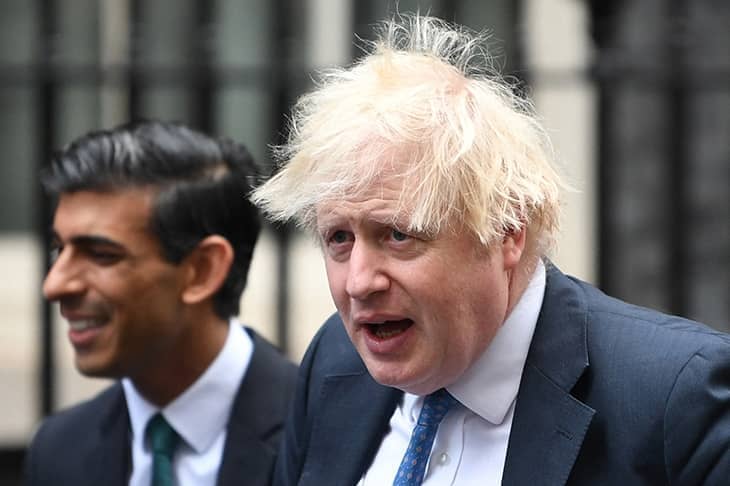Two and a half years into his premiership, Boris Johnson has enjoyed no more than a month of that time unencumbered either by Brexit negotiations or the public health emergency. Once Britain is through the worst of the Omicron wave, it would be understandable if the Prime Minister wanted to pursue some kind of political vision. The danger is that, as normality returns, his premiership will be further imperilled by the cost of living.
An economic crisis is expected to hit households in April. In that month, National Insurance contributions (NICs) will go up by 1.25 per cent, a direct violation of Johnson’s manifesto pledge to protect voters from tax rises. The price cap on energy bills will also be raised, possibly doubling some customers’ costs as they come off fixed rates. On top of that, inflation is already exceeding 5 per cent and looks set to rise further to 6 or 7 per cent — a level never before experienced by most working-age adults. While the jobs market seems steady and wages, notionally, have been rising fast, a fresh generation is about to learn that wage rises are of little help when prices are rising faster.
If the government has a political strategy to deal with the fallout, it is sadly not evident. Meanwhile, the leader of the opposition, Keir Starmer, has for once shown himself to have a finger on the nation’s pulse by opposing the rise in National Insurance. This might be a little hypocritical given that it was the last Labour government which jacked up NICs to their current level as a proxy for increasing income taxes, in the hope that taxpayers might notice it less. But it will be futile for the Tories to try to make that point.
It is not too late to cancel the rise in National Insurance and respect the Tory manifesto pledge
The Tories were right first time, when they condemned Gordon Brown for raising what they then called the ‘jobs tax’ and promised that, if elected, they would ‘kill the jobs tax’. They will be punished, and they deserve to be punished, in former Red Wall seats where Johnson may have been believed when he promised not to raise taxes. Cost of living is an even more acute issue for these seats than it is in more traditional Conservative strongholds — especially given that the additional revenue has been earmarked to cover care home costs in order to protect the inheritances of the relatively well-off.
It is not too late to cancel the rise in NICs, respect the Tory manifesto pledge, keep faith with these new Tory voters and think again about the balance of taxing and spending. The pandemic was inevitably going to incur a sharp rise in public spending, yet the loss of discipline in the public finances goes far beyond what was required. The crisis has been allowed to reset the whole culture of government, with much greater intervention in the economy generally — to extract from the average taxpayer enough money to subsidise the care-home costs of millionaires. It’s a deplorable scheme.
As for the rise in energy costs, there is plenty that could be done to alleviate the shock. While the crisis has been precipitated by a sharp rise in global gas prices, a lot of costs have been piled on gas and electricity through climate policy. Far from getting rid of what David Cameron memorably called the ‘green crap’ on energy bills, environmental and social levies have grown to the point that they now constitute a hefty 25 per cent of electricity bills — an unofficial tax which is beginning to rival the duty on road fuel.
These hidden, state-mandated levies pay for subsidies for wind and solar power as well as biomass power stations. They also include taxes on fossil fuels and over–generous handouts for feed-in tariffs, some or all of which could be reduced or at least moved away from consumers’ bills. To disguise this in electricity bills is a particularly unfair form of tax, and leaves far more of the burden on low-income households. Domestic fuel bills are also subject to 5 per cent VAT. Johnson once complained this was imposed on Britain by EU rules; it could now be removed.
In the longer term, the government needs seriously to rethink its target for achieving net-zero carbon emissions by 2050 — its current plans for which mean imposing huge bills on homeowners to switch from gas and oil boilers to electric heat pumps, which are more expensive to install and to run.
Aside from the issue of ministers and aides flouting lockdown restrictions, the public has been remarkably forgiving of the government during the pandemic. Policy failures have been excused. Poor spending decisions and high death tolls have been tolerated perhaps because, at least at the beginning of the crisis, no one really knew what to do.
But voters will not be in such a generous mood when they find their incomes shrinking in real terms as they struggle with high bills. A government which owes its existence to a newfound ability to reach relatively low-income voters is fast approaching a crisis which could turn out to be terminal.





Comments